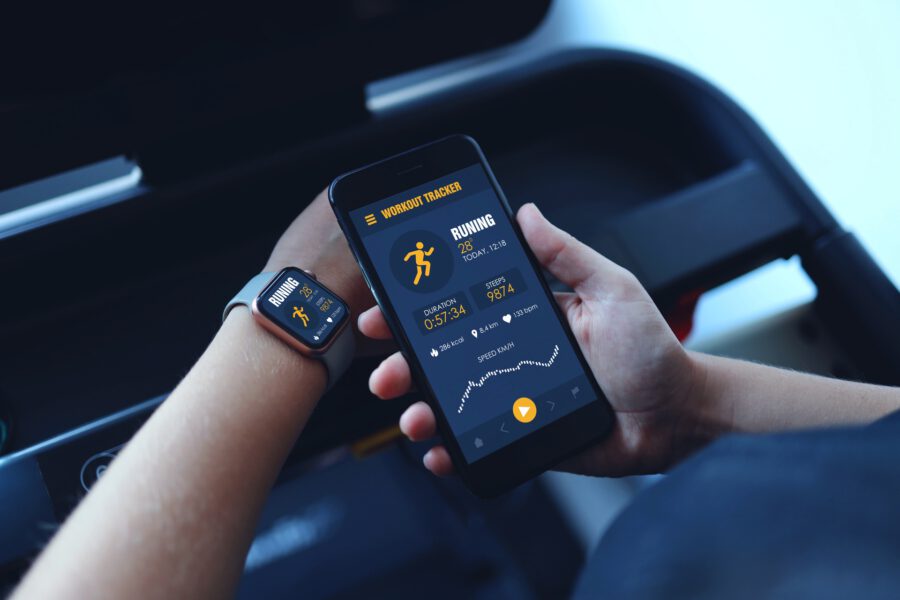Do You REALLY Need a Fitness Tracker?
There was a time in the not-too-distant past when all you needed to get in shape was a cheap pair of trainers and the will to get out of the house and make it happen.
But times have changed.
Nowadays you have got to spend some serious money before you can even dream of embarking on a fitness program. There’s the gym membership, the outfit, the workout shoes, and, of course, the fitness health tracker. In this article, we focus on the last of those supposed fitness essentials.
How essential is a fitness health tracker to achieving your fitness goals? Do you need a fitness tracker at all or is your money better spent elsewhere? What evidence is there that fitness trackers get you fitter, faster?
Let’s go beyond the hype and uncover the facts.
The key features of a modern-day fitness health tracker are:
- Distance tracking that keeps a record of your steps
- Activity sleep monitoring that provides a deep analysis of both the quantity and quality of your sleep
- Calorie tracking which calculates your calorie burn during exercise
- Heart rate tracking which lets you see how your pulse is reacting to your workout
- Wireless connectivity so you can transfer your training diagnostics to your computer
- Water resistance, so you can record your aqua workout training data
- Sweat resistance to prevent your exercise intensity from compromising your device’s integrity.
Fitness Tracker manufacturers claim that fitness trackers are the secret weapon that will propel you to your fitness goals. Looking beyond the hype we have managed to identify five key potential benefits of wearing a tracker...
By providing you with an accurate record of what you have actually accomplished, the health tracker makes you accountable to yourself. It is human nature to ascribe to ourselves more than we actually have done. The empirical data of what you have accomplished in terms of physical activity, calorie burn, and pulse rate activity encourages a person to do a little bit more the next day.
Some fitness health tracker apps allow you to share your results and goals with family and friends on social media platforms. This can extend your level of accountability to others, giving you extra motivation to succeed.
The best apps will allow you to personalize your goals in accordance with your current level of fitness and achievement. If you have a few 5K runs under your belt and are now training for a 10K, you can set your daily goal to progressively graduate toward that end result. Having a tangible goal on your wrist for each workout session focuses you and makes you more driven to achieving it – or so the fitness tracking people would have us believe!
A lot of people feel anxious about exercising. This is especially so when they work out in a public forum such as a gym. They may feel that others are watching and judging them.
When you have a fitness tracker, you have something to concentrate on. So long as you focus on achieving your goal for the day, you will succeed. In this way, your fitness health tracker can provide the ‘crutch’ that you need to get and keep you exercising.
The fact that you have invested a small fortune on your fitness tracker is, in itself, motivation to exercise. If you don’t, you have pretty much just wasted your money. And nobody wants to waste money. This psychological incentive may not be the best reason to exercise – but whatever works to get you active for the required 30 minutes per day has got to be positive.
Because we are living inside of our bodies, it can be very difficult for us to notice the changes that we are making in terms of such things as weight loss or muscle gain. But when you pair your fitness health tracker to your online app, you are able to track your progress over a period of weeks or even months.
Looking back over your progress in this way can allow you to see the progress that you have been making. This can be a huge motivator to continue on to bigger and better things. Alternately, if you notice that you have not been making the progress that you should have, you will be able to make the necessary changes rather than blindly continue along the same unfruitful path.
Here’s a workout you should try:
Effectiveness
In 2016, a study was published in the Journal of the American Medical Association (JAMA) which studied the effect of wearable fitness health tracking technology on long-term weight loss.
Researchers divided 471 overweight or obese adults into two groups. All participants were put on a low-calorie diet and an exercise plan. They were also given regular group sessions. One group was given a fitness tracking device that was paired with a computer app. The other group were simply asked to record their workouts manually in a diary.
The results showed that the group who wore the fitness tracking devices lost less weight than the group who recorded their training diagnostics manually. The fitness tracker group lost an average of 7.7 pounds over the two years of the trial, while the non-tracker group lost an average of 13 pounds.
This research outcome did not reflect favorably on the fitness health tracker market. As a result, various market leader spokespeople commented on the limitations of the study. A Fitbit spokesperson had this to say about the study . . .
The researchers point out that a limitation of their work includes the fact that they did not use a modern wearable device such as those offered by Fitbit. The upper arm device used in the study was limited to automatic data collection only.
The benefits of activity trackers are heavily reliant on the accuracy of the information they impart. So how accurate are they? A 2017 study sponsored by the American Council on Exercise tested five of the most popular activity trackers on the market. The devices selected were the following:
- Nike+ Fuelband
- Fitbit Ultra
- Jawbone UP
- BodyMedia FitCore
- Adidas MI Coach
The researchers recruited 20 healthy study participants and divided the study into two parts; the first part measured energy expenditure and the second measured steps taken. In addition to wearing the fitness trackers, the study patients also wore a very accurate metabolic analyser and an NL-2000i pedometer, which has also been proven to be extremely accurate.
For the first session, the study participants walked and ran on a treadmill while wearing the devices. For the second half of the study, the participants exercised on a cross trainer for twenty minutes. After a short break, they performed basketball drills.
The results of the first part of the study showed that the devices did a pretty good job of recording the accuracy of steps taken. All of them were accurate to the NL200i within a margin of error of 10 percent.
However, when it came to the basketball drills, all five devices showed a large underestimation of activity. According to the lead researcher on the study, Caitlin Stackpool M.S., the smaller and faster steps involved in agility training are often missed by the tracking devices.
When it came to caloric expenditure from exercise, there was an even greater disparity between the commercial fitness trackers and the metabolic analyser. Differences ranged between 13 and 60 percent.
Having looked at what fitness health trackers do, the supposed benefits claimed by its marketers, and the empirical research on their effectiveness and accuracy, what can we conclude?
If you are a person who is not a regular exerciser and are not intrinsically motivated then you are likely going to benefit from a fitness health tracker. It will get you up and exercising, but it will probably not continue doing so for the long term. Ideally, within that period that your tracker does get you up and exercising, you will develop the intrinsic motivation to keep going.
If, however, you are a person who is inherently intrinsically motivated you will probably not get a lot of benefit from a fitness health tracker. Your own willpower and inner desire to better yourself are sufficient to get you up and moving.
Frequently Asked Questions
Fitness trackers can help you stay accountable by providing data on your physical activity, calorie burn, and heart rate. They can motivate you to set and reach personal goals, but they are not essential for everyone. It's important to assess whether the features align with your fitness needs.
Key features to consider include distance tracking, heart rate monitoring, sleep analysis, calorie tracking, and water resistance. These features help you monitor various aspects of your fitness routine and overall health.
Yes, fitness trackers can assist with weight loss by tracking your daily activity levels and calorie expenditure. This data can help you make informed decisions about your diet and exercise routine to create a calorie deficit for weight loss.
Fitness trackers can be worth the investment if you find value in tracking your fitness metrics and need motivation to stay active. However, if you are disciplined and can track your progress without a device, you may not need one.
Fitness trackers improve accountability by providing real-time feedback on your activity levels and progress towards goals. Sharing your achievements on social media or with friends can further enhance accountability and motivation.
Alternatives to fitness trackers include using smartphone apps for tracking workouts and nutrition, or maintaining a fitness journal. The Gymaholic App offers features for tracking workouts and fitness plans that can help you stay on track without a dedicated device.
Fitness trackers provide estimates of sleep quality based on movement and heart rate data. While they offer some insights, they may not be as accurate as clinical sleep studies. For more on sleep's role in fitness, read The Essential Role of Sleep in Enhancing Your Fitness.

